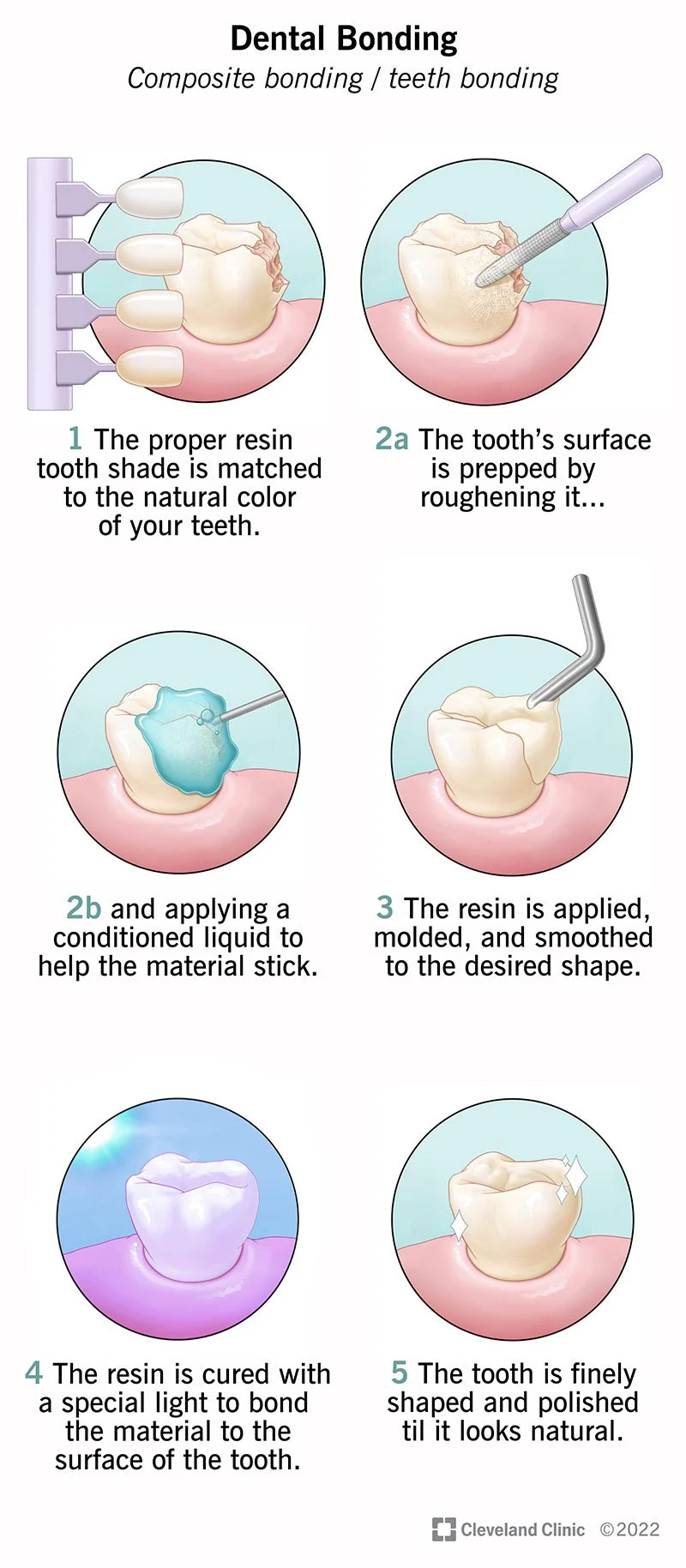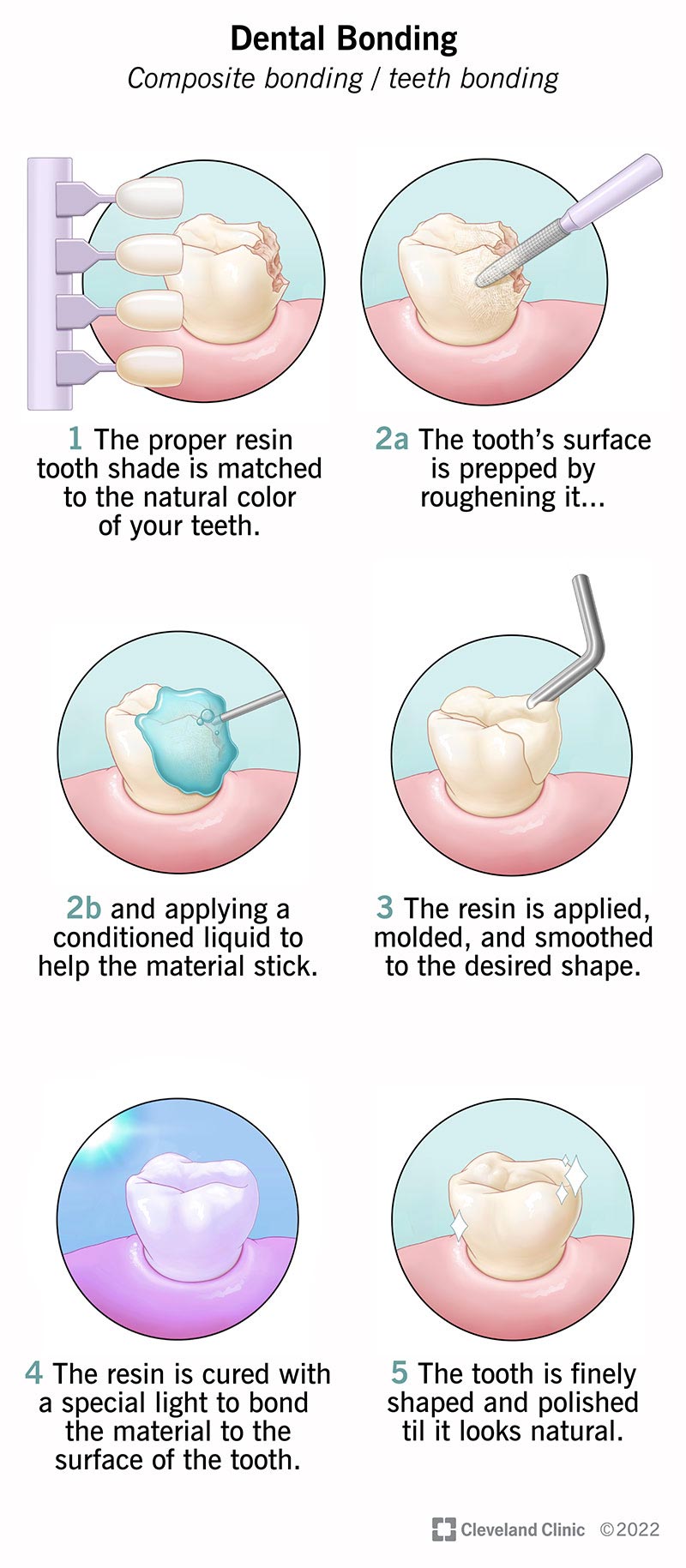
Dental bonding involves applying tooth-colored resin to teeth and addressing issues like chips, cracks, and gaps. The resin provides some protection but isn’t primarily for safeguarding teeth. Instead, it enhances aesthetics by concealing flaws. The resin material bonds to teeth when hardened with a special light. To ensure comprehensive tooth protection, routine oral care practices like brushing, flossing, and regular dental check-ups remain essential. While dental bonding offers cosmetic benefits and can shield exposed surfaces, its primary purpose is not tooth protection but rather aesthetic improvement. Therefore, for complete dental care, combining dental bonding with proper oral hygiene measures is crucial.
Does Dental Bonding Protect Teeth?
Dental bonding is a popular cosmetic dentistry procedure that involves the application of a tooth-colored resin material to the teeth. It is commonly used to improve the appearance of chipped, cracked, or discolored teeth. But does dental bonding actually protect teeth? In this article, we will explore the benefits of dental bonding and its role in protecting the teeth.
The Process of Dental Bonding
Dental Bonding Procedure:
- Dental bonding is a simple and minimally invasive procedure.
- Tooth surface preparation involves roughening and applying a conditioning liquid for improved bonding.
- Tooth-colored resin is applied and shaped to achieve the desired appearance.
- A special light is used to harden the resin.
- Final adjustments ensure a natural and comfortable fit.
- Typically completed in a single dental visit, making it convenient and cost-effective.
Benefits of Dental Bonding:
- Dental bonding strengthens and reinforces weakened or damaged teeth.
- It acts as a protective layer, shielding teeth from further damage and decay.
- It restores the shape and structure of chipped or cracked teeth, preventing further deterioration.
- The resin material can be color-matched to natural tooth shade, enhancing the smile’s aesthetics.
- Boosts confidence and self-esteem through improved appearance.
Protection Against Decay:
- Dental bonding seals vulnerable areas, protecting against bacteria and acids that cause decay.
- Particularly beneficial for individuals prone to tooth decay or those with deep grooves or pits in their teeth.
- Note that dental bonding is less durable than alternatives like veneers or crowns and may require periodic touch-ups or replacements.
- Regular dental check-ups and proper oral hygiene are essential for maintenance.
Protection Against Sensitivity:
- Dental bonding reduces tooth sensitivity, especially in cases of enamel erosion or gum recession.
- Acts as a protective layer covering exposed areas.
- Enhances comfort and quality of life for individuals with sensitive teeth.
In summary, dental bonding is a versatile and effective treatment offering both cosmetic enhancements and protective benefits. Consulting a qualified dentist is crucial to determine its suitability for specific dental needs.
Key Takeaways: Does Dental Bonding Protect Teeth?
- Dental bonding can help protect teeth from further damage.
- It is a procedure where a tooth-colored resin is applied to the tooth and then hardened with a special light.
- Bonding can be used to fix chips, cracks, and gaps in teeth.
- While bonding is not as strong as natural teeth, it can provide added protection and improve the appearance of the tooth.
- Regular brushing, flossing, and dental check-ups are still important for maintaining overall oral health.
Frequently Asked Questions
What is dental bonding?
Dental bonding is a cosmetic dental procedure that involves applying a tooth-colored resin material to the surface of the teeth. It is commonly used to repair chipped or cracked teeth, improve the appearance of discolored teeth, and close gaps between teeth. The resin material is carefully sculpted and shaped to match the natural contours of the teeth, providing a seamless and natural-looking result.
During the bonding process, the dentist will first roughen the surface of the tooth and apply a conditioning liquid. This helps the bonding material adhere to the tooth. The resin is then applied and molded into the desired shape. A special light is used to harden the material, and the dentist will further trim and polish it to ensure a smooth and polished finish.
Does dental bonding protect teeth?
Yes, dental bonding can provide some level of protection for teeth. The bonding material acts as a protective layer, covering the damaged or vulnerable areas of the tooth. It helps to prevent further damage, such as cracks or chips, and can also help to strengthen weakened teeth.
However, it is important to note that dental bonding is not as strong as natural tooth enamel or other restorative treatments like dental crowns or veneers. While it can provide temporary protection and improve the appearance of teeth, it may not be suitable for all cases. Your dentist will assess your specific situation and recommend the most appropriate treatment option for you.
How long does dental bonding last?
The lifespan of dental bonding can vary depending on several factors, including the location of the bonding, the patient’s oral hygiene habits, and their lifestyle choices. On average, dental bonding can last anywhere from 3 to 10 years.
It is important to note that dental bonding is not as durable as other restorative options like dental crowns or veneers. The bonding material can chip or stain over time, especially if the patient engages in habits like biting on hard objects or consuming staining foods and beverages. Regular dental check-ups and proper oral hygiene practices can help extend the lifespan of dental bonding.
Is dental bonding a permanent solution?
Dental bonding is considered a semi-permanent solution. While it is not intended to be a permanent fix, it can provide long-lasting results with proper care and maintenance.
Over time, the bonding material may wear down or become discolored, requiring touch-ups or replacement. However, with good oral hygiene practices and regular dental visits, dental bonding can provide an aesthetically pleasing and functional solution for many years.
Can dental bonding be used to fix gaps between teeth?
Yes, dental bonding can be used to fix gaps between teeth. It is a popular choice for individuals who have small gaps or spaces between their teeth, as it offers a relatively quick and cost-effective solution.
During the bonding process, the resin material is carefully applied and shaped to close the gap between the teeth, creating a more uniform and aligned smile. The bonding material can be color-matched to the natural shade of the teeth, ensuring a seamless and natural-looking result.
Dental Bonding vs Porcelain Veneers – Which Should I Get?
Final Summary: Does Dental Bonding Protect Teeth?
Dental bonding is an effective method for enhancing and safeguarding teeth. By applying a tooth-colored resin to address issues like chips, cracks, discoloration, and gaps, it offers both aesthetic and protective benefits. Its versatility allows customization for minor improvements or complete smile transformations. This procedure is quick, virtually painless, and can be completed in a single dental visit, making it cost-effective compared to alternatives like veneers or crowns. In summary, dental bonding is an excellent choice to improve and safeguard teeth, offering a natural-looking solution for various dental concerns. If you seek a confident smile, consider consulting your dentist about how dental bonding can be the right choice for you.
Call or Book appointment online
:Ace Dental Care Alpharetta office: 678-562-1555 - Book Now
Ace Dental Care Norcross office: 770-806-1255 - Book Now
Disclaimer
This blog post was generated by artificial intelligence. The content of this post may not be accurate or complete, and should not be relied upon as a substitute for professional advice. If you have any questions about the content of this post, please contact us.
We are constantly working to improve the accuracy and quality of our AI-generated content. However, there may still be errors or inaccuracies. We apologize for any inconvenience this may cause.






